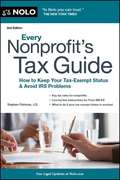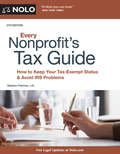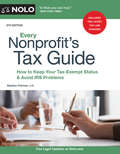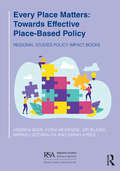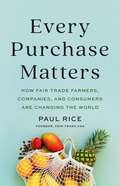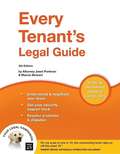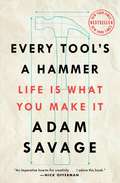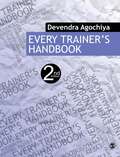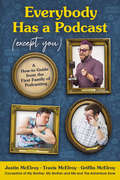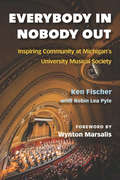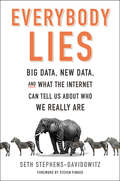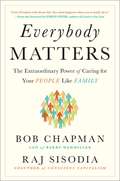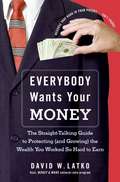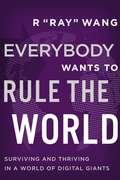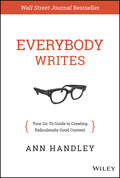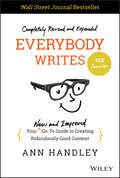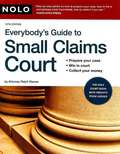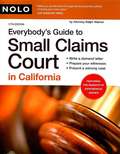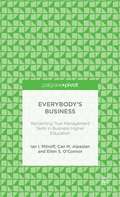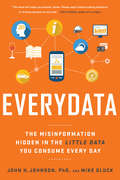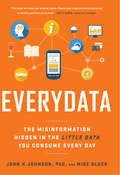- Table View
- List View
Every Nonprofit's Tax Guide
by Stephen Fishman J.DTax rules for your nonprofit -- stay legal and keep the IRS off your back Your nonprofit enjoys special privileges not available to other organizations -- but they come at a price. Nonprofits must comply with rules and regulations that don't apply to for-profit ventures. Every Nonprofit's Tax Guide explains these rules and what your nonprofit must do to maintain your tax-exempt status and avoid problems with the IRS. This practical, thorough, and easy-to-read book explains both ongoing and annual compliance requirements for nonprofits, including: rules for charitable giving and cash donations Form 990 unrelated taxable business income annual IRS filings and disclosures property donations bookkeeping basics working with independent contractors and volunteers restrictions on lobbying and political activities Plus, the book also includes a chapter on the types of transactions that can get your nonprofit in hot water with the IRS.
Every Nonprofit's Tax Guide: How to Keep Your Tax-Exempt Status & Avoid IRS Problems
by Stephen FishmanThe essential tax reference book for every nonprofit Nonprofits enjoy privileges not available to other organizations. But these privileges come at a price: Nonprofits must comply with special IRS rules and regulations. This book covers what your organization must do to maintain its tax-exempt status. Practical, comprehensive, and easy to understand, Every Nonprofit’s Tax Guide explains ongoing and annual IRS compliance requirements for nonprofits, including: a detailed look at Form 990 line-by-line instructions for Form 990-EZ conflicts of interest and compensation rules charitable giving rules unrelated taxable business income rules lobbying and political activity restrictions nonprofit bookkeeping other key tax rules Whether you are just starting your nonprofit or are well established, you’ll find all the information you need to avoid the most common issues nonprofits run into with the IRS.
Every Nonprofit's Tax Guide: How to Keep Your Tax-Exempt Status & Avoid IRS Problems
by Stephen FishmanThe essential tax reference book for every nonprofit Nonprofits enjoy privileges not available to other organizations. But these privileges come at a price: Nonprofits must comply with special IRS rules and regulations to maintain their tax-exempt status. Practical, comprehensive, and easy to understand, Every Nonprofit’s Tax Guide explains ongoing and annual IRS compliance requirements for nonprofits, including: a detailed look at Form 990 line-by-line instructions for Form 990-EZ conflicts of interest and compensation rules charitable giving rules unrelated taxable business income rules lobbying and political activity restrictions nonprofit bookkeeping, and other key tax rules. Whether you are just starting your nonprofit or are well established, you’ll find all the information you need to avoid the most common issues nonprofits run into with the IRS. Updated to include new rules that affect nonprofits under the Tax Cuts and Jobs Act, effective in 2018.
Every Place Matters: Towards Effective Place-Based Policy (Regional Studies Policy Impact Books)
by Sarah Ayres Andrew Beer Markku Sotarauta Fiona McKenzie Jiří BlažekAcross the globe policy makers implement, and academics teach and undertake research upon, place-based policy. But what is place-based policy, what does it aspire to achieve, what are the benefits of place-based approaches relative to other forms of policy, and what are the key determinants of success for this type of government intervention? This Policy Expo examines these questions, reviewing the literature and the experience of places and their governments around the world. We find place-based policies are essential in contemporary economies, providing solutions to otherwise intractable challenges such as the long-term decline of cities and regions. For those working in public sector agencies the success or failure of place-based policies is largely attributable to governance arrangements, but for researchers the community that is the subject of this policy effort, and its leadership, determines outcomes. This Policy Expo explores the differing perspectives on place-based policy and maps out the essential components of effective and impactful actions by government at the scale of individual places.
Every Purchase Matters: How Fair Trade Farmers, Companies, and Consumers Are Changing the World
by Paul RiceFrom the founder and CEO of Fair Trade USA, a critical account of the past, present and future of conscious capitalism--the change it has wrought in the world and the potential it still has to confront our greatest challenges. We all have the power to change the world through the products we buy. This simple premise has driven the growth of the conscious consumer movement for decades. Indeed, what started with a handful of niche sustainability brands has exploded into the mainstream with labels like Organic, Non-GMO, and Fair Trade Certified now adorning products in major retailers across the country. Yet the true promise of ethical sourcing and conscious consumerism has not been fully realized. Paul Rice has dedicated his career to helping consumers and businesses embrace the power they have to protect the environment and improve the lives of farmers and workers on the far side of our global supply chains. In Every Purchase Matters, Rice reveals the untold story of the Fair Trade movement and its significance for us all. Calling on the close relationships he cultivated over the last forty years with the pioneers of ethical sourcing—CEOs, activists, grassroots farmer leaders, and consumer advocates—Rice gives voice to the visionaries and practitioners who are making sustainable business the new normal. These protagonists share successes and failures, lessons learned, and their extraordinary impact in communities around the world. Their stories illuminate how sustainability is good not only for people and planet but also for business. Whether you&’re a consumer, a business leader, or an investor, Every Purchase Matters offers a rich and persuasive case for conscious capitalism—the change it has brought and the potential it still has to create a more just, equitable, and sustainable world.
Every Tenant's Legal Guide
by Janet Portman Marcia StewartWhat every renter needs to know The only book of its kind, Every Tenant's Legal Guide gives you the legal and practical information (plus dozens of sample letters) you need to: find a great home and landlord know your rights when it comes to pets fight improper rent increases and late fees get a landlord to make repairs pronto withhold rent without getting into legal trouble protect your privacy fight illegal discrimination handle roomate problems deal with lead paint, mold, asbestos and bed bugs break a lease with minimum financial liability get your security deposit back The 8th edition of Every Tenant's Legal Guide includes the latest laws of your state--from security deposit rules to termination notice requirements, and a new section on tenant rights to use Airbnb and similar services.
Every Tenant's Legal Guide
by Janet Portman Marcia Stewart<P>The only book of its kind, Every Tenant's Legal Guide gives you the legal and practical information (plus dozens of sample letters) you need to: <P>find a great home and landlord <br>know your rights when it comes to pets <br>fight improper rent increases and late fees <br>get a landlord to make repairs pronto <br>withhold rent without getting into legal trouble <br>protect your privacy <br>fight illegal discrimination <br>handle roommate problems <br>deal with lead paint, mold, asbestos and bed bugs <br>break a lease with minimum financial liability, and <br>get your security deposit back <p>This 9th edition of Every Tenant's Legal Guide includes the latest state rules and procedures on tenant rights, including how to legally break a lease and fight an eviction.
Every Tenant's Legal Guide (5th edition)
by Janet Portman Marcia StewartAttorney Portman and consumer rights specialist Stewart update their guide to dealing with both the ordinary and the exceptional aspects of renting a place to live on the planet where they were born. Among their topics are finding a place, basic rent rules, inspecting the unit and moving in, repairs, improvements, privacy, environmental hazards, crime on the premises, moving out and getting the deposit back, and resolving problems without a lawyer. Tables are appended summarizing relevant laws in the various states. No legal background is required. Annotation ©2007 Book News, Inc., Portland, OR (booknews.com)
Every Tool's a Hammer: Life Is What You Make It
by Adam SavageIn this New York Times bestselling &“imperative how-to for creativity&” (Nick Offerman), Adam Savage—star of Discovery Channel&’s Mythbusters—shares his golden rules of creativity, from finding inspiration to following through and successfully making your idea a reality.Every Tool&’s a Hammer is a chronicle of my life as a maker. It&’s an exploration of making, but it&’s also a permission slip of sorts from me to you. Permission to grab hold of the things you&’re interested in, that fascinate you, and to dive deeper into them to see where they lead you. Through stories from forty-plus years of making and molding, building and breaking, along with the lessons I learned along the way, this book is meant to be a toolbox of problem solving, complete with a shop&’s worth of notes on the tools, techniques, and materials that I use most often. Things like: In Every Tool There Is a Hammer—don&’t wait until everything is perfect to begin a project, and if you don&’t have the exact right tool for a task, just use whatever&’s handy; Increase Your Loose Tolerance—making is messy and filled with screwups, but that&’s okay, as creativity is a path with twists and turns and not a straight line to be found; Use More Cooling Fluid—it prolongs the life of blades and bits, and it prevents tool failure, but beyond that it&’s a reminder to slow down and reduce the friction in your work and relationships; Screw Before You Glue—mechanical fasteners allow you to change and modify a project while glue is forever but sometimes you just need the right glue, so I dig into which ones will do the job with the least harm and best effects. This toolbox also includes lessons from many other incredible makers and creators, including: Jamie Hyneman, Nick Offerman, Pixar director Andrew Stanton, Oscar-winner Guillermo del Toro, artist Tom Sachs, and chef Traci Des Jardins. And if everything goes well, we will hopefully save you a few mistakes (and maybe fingers) as well as help you turn your curiosities into creations. I hope this book serves as &“creative rocket fuel&” (Ed Helms) to build, make, invent, explore, and—most of all—enjoy the thrills of being a creator.
Every Town Is a Sports Town: Business Leadership at ESPN, from the Mailroom to the Boardroom
by Donald T. Phillips George BodenheimerA Best Business Book of 2015, Strategy Business ESPN's rise is one of the most remarkable stories about business and sports in our time, and nobody can tell it better than George Bodenheimer. It may be hard to believe, but not long ago, getting sports updates was difficult and frustrating. ESPN changed everything. George Bodenheimer knows. Initially hired to work in the mailroom, one of Bodenheimer's first jobs was to pick up sportscaster Dick Vitale at the Hartford airport and drive him to ESPN's main campus--a couple of trailers in a dirt parking lot. But as ESPN grew, so did George's status in the company. In fact, Bodenheimer played a major part in making ESPN a daily presence not just here, but all over the world. In this business leadership memoir--written with bestselling author Donald T. Phillips--Bodenheimer lays out ESPN's meteoric rise. This is a book for business readers and sports fans alike.
Every Trainer′s Handbook
by Devendra AgochiyaEvery Trainer′s Handbook, Second Edition is a practical guide that takes the reader through a step-by-step process of planning, organising and delivering an effective training programme. It offers concrete suggestions and guidelines to trainers for enhancing their knowledge and competencies while simultaneously engaging them in a substantive discussion on various concepts, theories and issues related to training. This new edition of the book enlarges the scope of the previous edition. Underscoring the importance of a cohesive and synthesised approach, it brings together all interrelated aspects of the learning process. Recognising the importance of general situations that a trainer has to handle in the delivery of the programme, it identifies new situations and issues that call for action by the trainer under a section ′Role of the trainer′. An entirely new section-Using question-response approach for enhancing participation-reinforces and substantiates the concept, meaning and scope of training. The handbook has been prepared keeping in view the needs of training different types of groups, in different settings, regardless of the nature of the groups or the themes of the training programmes. It is aimed at training managers, instructors at various training and educational institutions, organisers of workshops and seminars, those responsible for planning training programmes, and participants. Its content as well as its reader-friendly language and style make it suitable and relevant for all levels of trainers-the experienced ones or those who are new to professional training. It is a must-read for people specializing in the fields of business and management-training, human resource development, organizational design and development-and social development.
Everybody Has a Podcast (Except You): A How-to Guide from the First Family of Podcasting
by Justin McElroy Travis McElroy Griffin McElroyFrom the #1 New York Times bestselling McElroy Brothers, creators of the hit podcasts My Brother, My Brother and Me and The Adventure Zone, comes a helpful and hilarious how-to podcast guide covering everything you need to know to make, produce, edit, and promote a podcast…and get rich* doing it! (*Results not guaranteed.)Justin, Travis, and Griffin McElroy made their names as “advice giving brothers who have no business giving advice” (New York Times) on the hit podcast My Brother, My Brother and Me. But while they may not have the best relationship or workplace advice, they certainly make you laugh, and they do know a thing or two about podcasting. In fact, the McElroy Brothers have spent the last decade making podcasts, including My Brother, My Brother and Me; The Adventure Zone; Sawbones; and more. From their start, independently producing and releasing the early episodes of My Brother, My Brother and Me, to their eleven currently available podcasts, the McElroys have become experts in creating successful podcasts. And now, they want to share what they’ve learned with you. In Everybody Has a Podcast (Except You), the McElroy Brothers will walk you through the process of turning an idea into ear-candy for legions of fans, sharing their expertise on everything from deciding on an effective name (definitely not something like My Brother, My Brother and Me), what type of microphone to use (definitely not one from the video game Rock Band), to making lots and lots of money (spoiler: you probably won’t). A must-read for anyone interested in podcasting, Everybody Has a Podcast (Except You) shares the keys to success as well as the mistakes to avoid and draws on the vast experiences of three of the funniest and most successful podcasters working today.
Everybody In, Nobody Out: Inspiring Community at Michigan's University Musical Society
by Ken FischerHoused on the campus of the University of Michigan in Ann Arbor, the University Musical Society is one of the oldest performing arts presenters in the country. A past recipient of the National Medal of Arts, the nation’s highest public artistic honor, UMS connects audiences with wide-ranging performances in music, dance, and theater each season.Between 1987 and 2017, UMS was led by Ken Fischer, who over three decades pursued an ambitious campaign to expand and diversify the organization’s programming and audiences—initiatives inspired by Fischer’s overarching philosophy toward promoting the arts, “Everybody In, Nobody Out.” The approach not only deepened UMS’s engagement with the university and southeast Michigan communities, it led to exemplary partnerships with distinguished artists across the world. Under Fischer’s leadership, UMS hosted numerous breakthrough performances, including the Vienna Philharmonic’s final tour with Leonard Bernstein, appearances by then relatively unknown opera singer Cecilia Bartoli, a multiyear partnership with the Royal Shakespeare Company, and artists as diverse as Yo-Yo Ma, Jawole Willa Jo Zollar, Elizabeth Streb, and Nusrat Fateh Ali Khan. Though peppered with colorful anecdotes of how these successes came to be, this book is neither a history of UMS nor a memoir of Fischer’s significant accomplishments with the organization. Rather it is a reflection on the power of the performing arts to engage and enrich communities—not by handing down cultural enrichment from on high, but by meeting communities where they live and helping them preserve cultural heritage, incubate talent, and find ways to make community voices heard.
Everybody Knows: Russia and the Election
by Rawi Abdelal Rafael Di Tella Galit GoldsteinFollowing a contentious presidential race, Donald Trump's 2016 election destabilized America's status quo. Academics, journalists, politicians and the public at large examined why Trump had won. Many Americans, inside and outside the government, asserted that a state-led Russian disinformation campaign had influenced the election's outcome. The leaders of major social media companies, including Twitter and Facebook, also conceded that state actors had probably gamed their platforms to influence American politics. Trump himself made conflicting statements, while Russian politicians asserted that American elites had rhetorically weaponized the issue of election interference to justify an unwillingness to work with their country internationally. It was hard to parse where reality ended and political rhetoric began. Post-election, the future of U.S.-Russia relations remained unclear, and the United States grappled with how to regulate cyberspace. Analyzing the 2016 election and its aftershocks helps students confront interrelated questions about business regulation, international relations, cultural identity, strategic communications, political will and the Internet. The case encourages students to consider the boundary between narrative and reality, and examine subjectivity, objectivity and power in the public and private sectors.
Everybody Lies: Big Data, New Data, and What the Internet Can Tell Us About Who We Really Are
by Seth Stephens-DavidowitzForeword by Steven PinkerBlending the informed analysis of The Signal and the Noise with the instructive iconoclasm of Think Like a Freak, a fascinating, illuminating, and witty look at what the vast amounts of information now instantly available to us reveals about ourselves and our world—provided we ask the right questions.By the end of on average day in the early twenty-first century, human beings searching the internet will amass eight trillion gigabytes of data. This staggering amount of information—unprecedented in history—can tell us a great deal about who we are—the fears, desires, and behaviors that drive us, and the conscious and unconscious decisions we make. From the profound to the mundane, we can gain astonishing knowledge about the human psyche that less than twenty years ago, seemed unfathomable. Everybody Lies offers fascinating, surprising, and sometimes laugh-out-loud insights into everything from economics to ethics to sports to race to sex, gender and more, all drawn from the world of big data. What percentage of white voters didn’t vote for Barack Obama because he’s black? Does where you go to school effect how successful you are in life? Do parents secretly favor boy children over girls? Do violent films affect the crime rate? Can you beat the stock market? How regularly do we lie about our sex lives and who’s more self-conscious about sex, men or women? Investigating these questions and a host of others, Seth Stephens-Davidowitz offers revelations that can help us understand ourselves and our lives better. Drawing on studies and experiments on how we really live and think, he demonstrates in fascinating and often funny ways the extent to which all the world is indeed a lab. With conclusions ranging from strange-but-true to thought-provoking to disturbing, he explores the power of this digital truth serum and its deeper potential—revealing biases deeply embedded within us, information we can use to change our culture, and the questions we’re afraid to ask that might be essential to our health—both emotional and physical. All of us are touched by big data everyday, and its influence is multiplying. Everybody Lies challenges us to think differently about how we see it and the world.
Everybody Matters: The Extraordinary Power of Caring for Your People Like Family
by Bob Chapman Raj Sisodia"Bob Chapman, CEO of the $1.7 billion manufacturing company Barry-Wehmiller, is on a mission to change the way businesses treat their employees." - Inc. MagazineStarting in 1997, Bob Chapman and Barry-Wehmiller have pioneered a dramatically different approach to leadership that creates off-the-charts morale, loyalty, creativity, and business performance. The company utterly rejects the idea that employees are simply functions, to be moved around, "managed" with carrots and sticks, or discarded at will. Instead, Barry-Wehmiller manifests the reality that every single person matters, just like in a family. That's not a cliché on a mission statement; it's the bedrock of the company's success.During tough times a family pulls together, makes sacrifices together, and endures short-term pain together. If a parent loses his or her job, a family doesn't lay off one of the kids. That's the approach Barry-Wehmiller took when the Great Recession caused revenue to plunge for more than a year. Instead of mass layoffs, they found creative and caring ways to cut costs, such as asking team members to take a month of unpaid leave. As a result, Barry-Wehmiller emerged from the downturn with higher employee morale than ever before. It's natural to be skeptical when you first hear about this approach. Every time Barry-Wehmiller acquires a company that relied on traditional management practices, the new team members are skeptical too. But they soon learn what it's like to work at an exceptional workplace where the goal is for everyone to feel trusted and cared for--and where it's expected that they will justify that trust by caring for each other and putting the common good first. Chapman and coauthor Raj Sisodia show how any organization can reject the traumatic consequences of rolling layoffs, dehumanizing rules, and hypercompetitive cultures. Once you stop treating people like functions or costs, disengaged workers begin to share their gifts and talents toward a shared future. Uninspired workers stop feeling that their jobs have no meaning. Frustrated workers stop taking their bad days out on their spouses and kids. And everyone stops counting the minutes until it's time to go home. This book chronicles Chapman's journey to find his true calling, going behind the scenes as his team tackles real-world challenges with caring, empathy, and inspiration. It also provides clear steps to transform your own workplace, whether you lead two people or two hundred thousand. While the Barry-Wehmiller way isn't easy, it is simple. As the authors put it:"Everyone wants to do better. Trust them. Leaders are everywhere. Find them. People achieve good things, big and small, every day. Celebrate them. Some people wish things were different. Listen to them. Everybody matters. Show them." From the Hardcover edition.
Everybody Wants Your Money
by David W. LatkoA street-smart guide by a trusted expert that exposes how we make shocking money mistakes, often involving the people we trust the most, and explains how we can prevent or undo those missteps. In Everybody Wants Your Money, David W. Latko uses straight talk, a sense of humor, and vivid human stories from the trenches of real life, to illuminate the potentially catastrophic fiscal missteps that Americans make in the course of their lives. He shows readers a sensible path to success and financial security, carefully documented with solid facts. As Latko emphasizes throughout the book, most of the money-related lessons we have been taught since childhood simply are wrong. Attempting to apply such misinformation to our personal financial practices, virtually ensures failure. We fall into these money traps by trusting our family, our adult children, our financial advisors, neighbors, or friends. Most of these people mean us no conscious harm, but are in the grips of the same misguided conventional wisdom that leads people into money minefields that cost us BIG. Latko advises readers on the common errors people make in selecting and entrusting a financial advisor, and explains how to make an informed choice where you stay in control. He brings to light the mistakes many retirees make in giving their adult children the keys to their financial kingdom -and offers innovative, low-risk strategies for protecting, and passing on, our lifetime's wealth. Latko challenges the conventional wisdom of divorce settlements, asserting that the so-called 'equal' division of assets is almost always a travesty to the women involved. Using real-life case histories, Latko shows precisely how most divorce settlements are structured to trap the ex-spouse in a downward spiral of poverty. --This text refers to the Kindle Edition
Everybody Wants to Rule the World: Surviving and Thriving in a World of Digital Giants
by R Ray" WangWhich kinds of companies will thrive and which will get crushed by the powerful forces in the global business landscape now at work? This groundbreaking new guide will help you adapt and change your business to thrive among digital giants, including Google, Facebook, and Amazon.Drawing on considerable original research and case studies from Wang&’s acclaimed firm, Constellation Research, this groundbreaking guide reveals which kinds of companies will thrive and which will get crushed by the powerful forces now at work.Ultimately, you will understand how the business world is changing in the face of extreme competition and, most importantly, you will learn how to adapt now to stay relevant and in demand.Everybody Wants to Rule the World will help you:Understand the power of Data-Driven Digital Networks and how they have driven the most successful companies of our time.Learn how extreme consolidation is changing the global business landscape and what this means for businesses of all types and sizes in terms of understanding where you fit in the value chain.Gain insights into what innovative companies are doing right now to position themselves in this new reality.Take your business from status quo to market leader.
Everybody Writes: Your Go-To Guide to Creating Ridiculously Good Content
by Ann HandleyFinally a go-to guide to creating and publishing the kind of content that will make your business thrive.Everybody Writes is a go-to guide to attracting and retaining customers through stellar online communication, because in our content-driven world, every one of us is, in fact, a writer.If you have a web site, you are a publisher. If you are on social media, you are in marketing. And that means that we are all relying on our words to carry our marketing messages. We are all writers.Yeah, but who cares about writing anymore? In a time-challenged world dominated by short and snappy, by click-bait headlines and Twitter streams and Instagram feeds and gifs and video and Snapchat and YOLO and LOL and #tbt. . . does the idea of focusing on writing seem pedantic and ordinary?Actually, writing matters more now, not less. Our online words are our currency; they tell our customers who we are.Our writing can make us look smart or it can make us look stupid. It can make us seem fun, or warm, or competent, or trustworthy. But it can also make us seem humdrum or discombobulated or flat-out boring.That means you've got to choose words well, and write with economy and the style and honest empathy for your customers. And it means you put a new value on an often-overlooked skill in content marketing: How to write, and how to tell a true story really, really well. That's true whether you're writing a listicle or the words on a Slideshare deck or the words you're reading right here, right now...And so being able to communicate well in writing isn't just nice; it's necessity. And it's also the oft-overlooked cornerstone of nearly all our content marketing.In Everybody Writes, top marketing veteran Ann Handley gives expert guidance and insight into the process and strategy of content creation, production and publishing, with actionable how-to advice designed to get results.These lessons and rules apply across all of your online assets -- like web pages, home page, landing pages, blogs, email, marketing offers, and on Facebook, Twitter, LinkedIn, and other social media. Ann deconstructs the strategy and delivers a practical approach to create ridiculously compelling and competent content. It's designed to be the go-to guide for anyone creating or publishing any kind of online content -- whether you're a big brand or you're small and solo.Sections include:How to write better. (Or, for "adult-onset writers": How to hate writing less.)Easy grammar and usage rules tailored for business in a fun, memorable way. (Enough to keep you looking sharp, but not too much to overwhelm you.)Giving your audience the gift of your true story, told well. Empathy and humanity and inspiration are key here, so the book covers that, too.Best practices for creating credible, trustworthy content steeped in some time-honored rules of solid journalism. Because publishing content and talking directly to your customers is, at its heart, a privilege."Things Marketers Write": The fundamentals of 17 specific kinds of content that marketers are often tasked with crafting.Content Tools: The sharpest tools you need to get the job done.Traditional marketing techniques are no longer enough. Everybody Writes is a field guide for the smartest businesses who know that great content is the key to thriving in this digital world.
Everybody Writes: Your New and Improved Go-To Guide to Creating Ridiculously Good Content
by Ann HandleyA hands-on field guide to consistently creating page-turning content that your audience loves. (And that delivers real results.) In the newly revised and updated edition of Everybody Writes, marketer and author Ann Handley improves on her Wall Street Journal bestselling book that&’s helped hundreds of thousands become better, more confident writers. In this brand-new edition, she delivers all the practical, how-to advice and insight you need for the process and strategy of content creation, production, and publishing. This new edition also includes: All-new examples, tools, resources Updated step-by-step writing framework Added and expanded chapters that reflect the evolution of content marketing (and evolution of Ann&’s thinking about what works today) The same witty and practical how-to approach How to attract and retain customers with stellar online communication How to choose your words well, sparingly, and with honest empathy for your customers Best practices and ideas for crafting credible, trustworthy content &“Things Marketers Write&”: The fundamentals of 19 specific kinds of content that marketers like you write Inspiration. Confidence. Fun.In this book, you&’ll discover: Content marketing has evolved. Yet writing matters more than ever. In this new edition of Everybody Writes, you&’ll find the strategies, techniques, tips, and tools you&’ll need to refine, upgrade, and (most of all) inspire your own best content marketing.
Everybody's Guide to Small Claims Court (12th edition)
by Ralph Warner Emily DoskowProper presentation of a small claims court case can make the difference between receiving a check and writing one. This bestselling guide shows readers how to: decide the legitimacy of a case; determine how much to sue for; find out whether it's possible to collect; settle a case before it goes to court; file and serve papers; and more. The book covers small claims court procedures in Canada as well as the U.S.
Everybody's Guide to Small Claims Court in California (17th edition)
by Ralph Warner Emily DoskowThe definitive guide for more than 20 years, this book explains how to present a winning case from start to finish. It illustrates how to: decide the legitimacy of a case; write a demand letter; file and serve papers; prepare evidence and witnesses for court; argue before a judge; defend a Small Claims case; and collect money after winning. Includes down-to-earth examples of the most common Small Claims Court cases.
Everybody’s Business: Reclaiming True Management Skills in Business Higher Education
by Can M. Alpaslan Ian I. Mitroff Ellen S. O’connorEverybody's Business is a succinct analysis of the factors that led to the founding of American business schools and why they are the way they are. Mitroff, Alpaslan, and O'Connor consider why current business schools do not give students the knowledge and the tools they need to deal with today's complex, messy problems and systems.
Everydata: The Misinformation Hidden in the Little Data You Consume Every Day
by John H. Johnson Mike GluckWhile everyone is talking about "big data," the truth is that understanding the "little data" (stock reports, newspaper headlines, weather forecasts, etc.) is what will help you make smarter decisions at work, at home, and in every aspect of your life. The average person consumes approximately 30 gigabytes of data every single day, but has no idea how to interpret it correctly. Everydata explains, through the eyes of an expert economist and statistician, how to correctly interpret all of the small bytes of data we consume in a day. Readers will become effective, skeptical consumers of everyday data. * Everydata is filled with countless examples of people misinterpreting data - oftentimes with catastrophic results: * Millions of women avoid caffeine during pregnancy because they interpret correlation as causation * The initial launch of HealthCare.gov failed in part because key decision-makers couldn't observe all of the data * A baby food company was investigated by the Federal Trade Commission for cherry picking data * Attorneys faced a $1 billion jury verdict because of outlier data * The Space Shuttle Challenger exploded because the engineers were dealing with a limited sample set * Hedge fund companies claim they can make smarter predictions - but the market data says otherwise Each chapter of Everydata highlights one commonly misunderstood data concept, using both real-world and hypothetical examples from a wide range of topics, including business, politics, advertising, law, engineering, retail, parenting, and more. Readers will get the answer to the question--"Now what?"--along with concrete ways they can use this information to immediately start making smarter decisions, today and every day.
Everydata: The Misinformation Hidden in the Little Data You Consume Every Day
by John H. JohnsonWhile everyone is talking about "big data," the truth is that understanding the "little data"--the stats that underlie newspaper headlines, stock reports, weather forecasts, and so on--is what helps you make smarter decisions at work, at home, and in every aspect of your life. The average person consumes approximately 30 gigabytes of data every single day, but has no idea how to interpret it correctly. EVERYDATA explains, through the eyes of an expert economist and statistician, how to decipher the small bytes of data we consume in a day. EVERYDATA is filled with countless examples of people misconstruing data--with results that range from merely frustrating to catastrophic: The space shuttle Challenger exploded in part because the engineers were reviewing a limited sample set. Millions of women avoid caffeine during pregnancy because they interpret correlation as causation. Attorneys faced a $1 billion jury verdict because of outlier data. Each chapter highlights one commonly misunderstood data concept, using both realworld and hypothetical examples from a wide range of topics, including business, politics, advertising, law, engineering, retail, parenting, and more. You'll find the answer to the question--"Now what?"--along with concrete ways you can use this information to immediately start making smarter decisions, today and every day.
